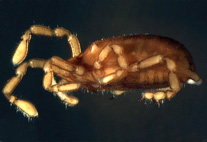Abstract
In the comprehensive rearing of lepidopterans from peninsular India, eleven species of Lycaenidae were parasitized by ten species of wasps. Four new taxa of lycaenid associated microgastrine wasps Parapanteles eros Gupta n. sp., P. arka Gupta n. sp., P. esha Gupta n. sp., and P. regale Gupta n. sp. reared from Chilades pandava (Horsfield), Curetis thetis (Drury), Prosotas dubiosa (Semper), Tajuria cippus (Fabricius), respectively, are described with diagnostic details and illustrations along with documentation of six species of wasps viz., Apanteles folia, Apanteles sp., Protapanteles sp. 01 & 02 (Braconidae), Charops obtusus obtusus Morley (Ichneumonidae), and Brachymeria lasus (Walker) (Chalcididae). This is the first record of host-parasitoid association of lycaenid butterflies with Parapanteles. Wasps from three different families were recorded: Braconidae, Ichneumonidae, and Chalcididae. The parasitoid species were reared from the following Lycaenidae hosts: Anthene lycaenina (Felder), Arhopala amantes Hewitson, Chilades pandava (Horsfield), Curetis thetis (Drury), Jamides celeno (Cramer), Prosotas dubiosa (Semper), Rathinda amor (Fabricius), Spindasis vulcanus (Fabricius), Tajuria cippus (Fabricius), Tarucus balkanicus nigra Bethune-Baker, and Tarucus callinara Butler. All lycaenids were collected from peninsular India, except T. callinara (central India). A comparative account of all newly described species is provided along with the detailed illustrated description and differences vis-à-vis its closely allied Indian species. Also a comprehensive table comprising parasitoid species, associated host, stage of parasitism, and nature of cocoon is provided.

